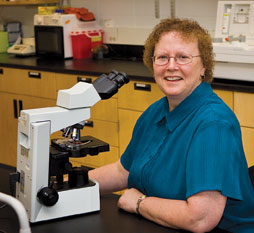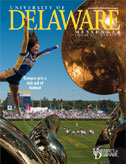10 things to know about medical lab tests

ON THE GREEN | Mary Ann McLane, professor of medical technology and of biological sciences and a certified medical laboratory scientist, is the 2009-10 president of the American Society of Clinical Laboratory Science (ASCLS), which represents more than 10,000 clinical lab professionals in the United States.
She says her goal as president of the organization—the first ever from Delaware—is to encourage members to communicate more about the profession and its key role in patient care. Clinical laboratory professionals design, perform and interpret the results of the billions of clinical lab tests conducted in the U.S. each year.
“It’s not the doctor or the nurse doing the test that will provide important objective data used in diagnostic and treatment decisions; it’s the clinical laboratory professional,” McLane says. “But because we work behind the scenes, the public isn’t usually aware of what we do.”
McLane has long been involved in outreach and public education. Among other activities, she makes presentations to help consumers understand their test results and is among a group of professionals who volunteer their time to answer patients’ questions individually and confidentially through an ASCLS Web page. Here is some advice from her and her colleagues.
Before the test
1. Ask your healthcare provider to explain, in terms you can understand, what laboratory tests are being ordered and how the results will help him or her make a diagnosis and decide on possible treatment.
2. Read the order for the lab tests before you leave your healthcare provider’s office and make sure you can read the writing. If you cannot, ask the office to write it more clearly.
3. Make sure the order explains any special instructions you must follow, such as fasting for a certain number of hours before the test or avoiding specific types of foods, and be very careful to follow those directions. If no instructions are listed, ask if any special preparations are needed.
During the test
4. Laboratory professionals should always ask you to verify your identity. Watch your specimens being labeled before you leave the lab.
5. Healthcare professionals must either wash their hands or use a bacterial hand cleaner between patients, and they must put on fresh gloves. If you do not see these precautions, ask if they have been taken.
6. If you have not followed all the directions you were given, such as fasting overnight, alert the person collecting the sample and explain exactly how you deviated from the instructions.
After the test
7. When your healthcare provider explains the test results, inform him or her of any medications, including vitamins and supplements, you are taking, especially those you took the day before the test. This information will be useful if your doctor has any questions about the test results.
8. The medical lab will send test results to your healthcare provider, not directly to you, but you can ask your doctor for a copy and keep it for your records. On the printed copy, the column of numbers to the right of your results will list the “reference range”—the results expected for most people taking that particular test and using the same laboratory—for that test.
9. If you have additional questions about medical laboratory tests and procedures, visit www.labtestsonline.org for information from laboratory professionals. For confidential, information about your own test results, provided by volunteers from the ASCLS, visit www.ascls.org/labtesting.
At all times
10. If you have any questions or concerns, speak up.





